Engage Nepal with Science has been running since the beginning of 2019 as a collaboration between the Research Institute for Bioscience and Biotechnology (RIBB, Nepal) and the Wellcome Centre for Cell Biology (WCB, UK) and aims to spread the culture of engaging Nepalese communities with science and scientific research to empower, inspire and build confidence in STEM.
How did the organisation start?
Engage Nepal with Science was conceived by Alba Abad, researcher at the WCB, who travelled to Nepal for a career break. During her stay in Nepal she volunteered as a teacher at several schools and realised that science education was textbook-based and lacked hands-on practices, which gave her an idea. She got in touch with the RIBB team to explain her idea, and after a great discussion, full of excitement, they embarked on their new adventure together: Engage Nepal with Science was born and a science engagement programme in Nepal was developed. Since then, 36 schools and over 2000 participants have been engaged via more than 30 workshops.
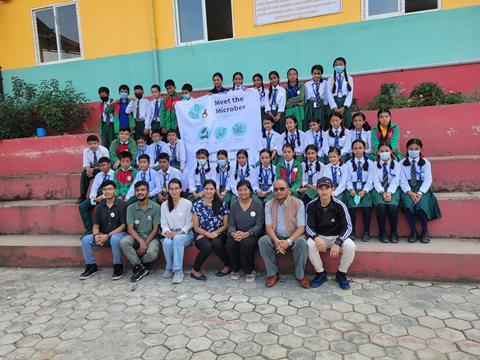
Meet the Microbes – good and bad
Meet the Microbes was part of the Engage Nepal with Science programme for 2021–2022 and was developed as a result of the various previous interactions with students. The Engage Nepal with Science team realised that students and their communities perceived microbes as a threat (although often not knowing how to fight them…) and were unable to credit the vast population of ‘good’ microbes and their benefits. Therefore, it was decided to design a two-day workshop where students would be introduced to the day-to-day presence of microbes and their benefits, while being made aware of their dangers and how to combat them. Thus, the first day focused on three demonstrations: ‘How do we make yoghurt?’, ‘How does yeast work and how can we use it to our advantage?’ and ‘Chemistry behind soap making’. On the second day, participants were able to experience the products that were made on the previous day: they tasted yoghurt and washed their hands with soap, along with setting up agar plates with clean and dirty hands. Further, the students were divided into groups to go around the four stalls with hands-on activities: ‘Life behind yoghurt and bread’, ‘A zoo in your pond’, ‘Make your own microbe!’ and ‘Microalgae’.
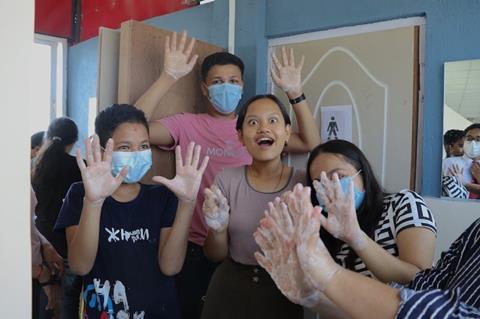
Secondary schools in Nepal – beyond the books
Meet the Microbes was key to continuing our work promoting creative and dynamic STEM education in Nepal, reaching audiences beyond the Kathmandu valley where most of the research in Nepal is centred. Meet the Microbes aimed to bring science to four districts from mainly the Terai region of Nepal, where communities had not been exposed to any science beyond what is found in books. The four host schools were: Pipal Bhanjyang Secondary School (Sindhuli), Jhapa Model Higher Secondary School (Jhapa), Shree Tulsiram Satyabhama Dotel Secondary School (Siraha) and Kanchan English Secondary School (Lalitpur).
What was needed?
These schools either had limited resources, lacked motivation for progressive education or were deprived of opportunities for any academic and/or non-academic growth. For instance, Shree Tulsiram Satyabhama Dotel Secondary school, a community-based (government) school, had some laboratory facilities but had limitations when it came to motivated teaching staff who knew how to use scientific equipment. On the contrary, a private school like Jhapa Model had good facilities and were well aware of the essential changes required in their unrefined teaching system but had never had the opportunity to work with researchers/science communicators before. These workshops helped and supported these schools in making their teaching more progressive and dynamic.
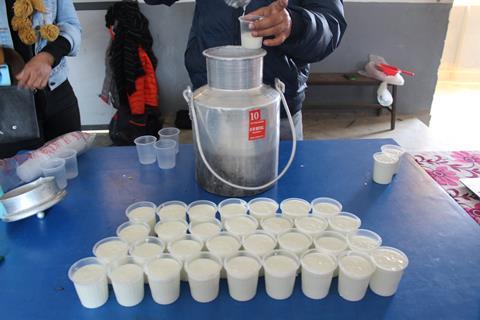
Were the challenges overcome?
The overall vision of this project was to promote practical-based education of microbiology in schools from deprived regions of Nepal, which was already a challenge in itself as the education system of Nepal, especially in the government schools, is not progressive; and making the concerned authorities understand the importance of hands-on practices has always been difficult. However, this time the pandemic came up as the greatest challenge. Due to COVID, and the fact that the designed workshops were required to be delivered in person, the delivery was very challenging. Nevertheless, even in those difficult times, the objectives of the project were met, as the team was able to:
1) Entice the students with microbiology and encourage them to become more curious and think in a scientific/evidence-based way.
2) Inspire local teachers, build their confidence in science education and support their science communication skills to make learning of microbiology at schools more hands-on in a sustainable manner.
3) Build capacity of their existing science laboratories with the donation of a portable microscope and plant and animal cell models.
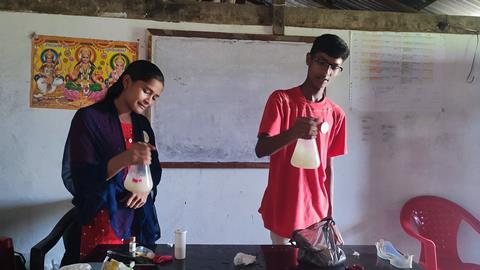
Who was involved?
Not only were the students and teachers enticed with the practical based learning, but the involved researchers were also exposed to a completely new experience of communicating science to the community. A total of 14 researchers were involved during the four workshops, some of them repeating their visits. The experience of researchers, teachers and students can be summarised by one of the researchers after her school visit:
‘The most interesting part of the project was seeing the curiosity of the students and teachers. The way they were raising questions, their excitement to make microbes by themselves using plasticine, and seeing the movement of the microbes under a microscope were memorable moments of the project. Along with students and teachers we also learned about the benefits of learning by doing. This programme taught us that we could change the student’s experience and conception of the learning process with workshops like this’.
The AMI funding represented a great opportunity to engage communities with microbiology. Building on the experiences of researchers, teachers and students during these workshops, combined with the vulnerability of Nepal to climate change, the team is now working on the development of new workshops focusing on environmental microbiology, dealing with biodegradation and natural food preservatives. You will be able to read more about it soon on our website.
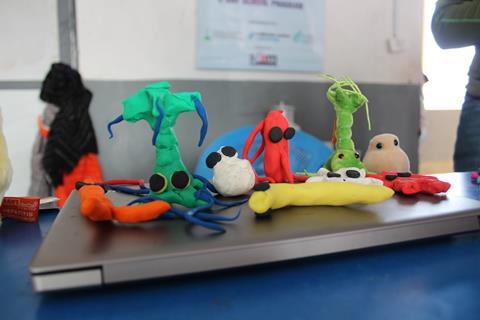
Could I get involved?
Being part of a project like this is an incredible personal and professional experience, and we would recommend anyone to try it. You just need an idea that an amazing organisation like SfAM (now Applied Microbiology International) would be willing to sponsor and the desire to make a difference by spreading your passion for science and sparkling curiosity in others. Get in touch with us if you would like to join us in our venture!
Please also read the post from one of the RIBB researchers regarding her experience delivering the Meet the Microbes workshop.








No comments yet